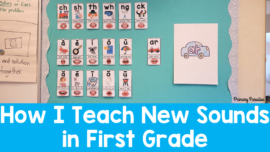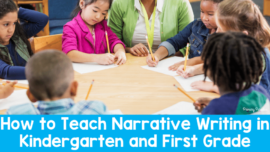Building Confidence in your writers is important. Confident writers are more willing to take risks and try new things. I’ve previously written about ways to boost your writer’s confidence. Here are three ways to specifically boost developing or beginning writer’s confidence.
Share a variety of mentor texts to boost writer confidence
First, good quality mentor texts are super important for developing strong writers. This is especially true for beginning writers who might still be working to develop the very basics of writing. You can help build your students’ confidence by sharing all kinds of mentor texts. Showing students that there’s not one way to write a story and that we all have our own perspective and voice, is very powerful.
Showing students wordless picture books shows them that even the most beginner writer can still share a story. Sharing books with very little text shows students that they don’t have to write pages and pages to create an interesting story. Share funny books, serious books, happy books, sad books. The wider the variety of mentor texts that students are presented with, the more they’ll realize that we all have stories to tell. Find a list of great mentor texts by grade level here.
Help your developing writers plan their writing
A blank piece of paper can feel very intimidating. Even now, as an adult, I struggle to sit down and just start writing from nothing. When I’m drafting a blog post, I first come up with a topic, then I create a plan or outline. From there, I can create a (hopefully) helpful and clear article.
It’s the same way for out students. The second way to help boost writing confidence is to help students learn to plan their writing. Understanding how to plan writing makes the actual writing part way less intimidating. This is why I build brainstorming and planning into every lesson of my year long writing curriculum.
It’s not enough to give our students a graphic organizer and expect them to figure it out. We need to implicitly model how to plan writing. For our developing writers, that means walking them through it step by step, keeping it simple, and then slowly letting them plan more and more on their own. This will eventually give them the confidence to plan and write pieces they’re proud of. You can read exactly how I do this right here.
Empower beginning writers to write descriptively
Words are powerful. Lastly, we can teach our developing writers that, even as they’re learning to write, they can make their writing more interesting with careful word choice. The beauty of teaching students how to write descriptively is that you can encourage them to use their senses. This makes it concrete and easy to understand. A developing writer might write the sentence “The boy was sad.” But, with some guidance, could develop that sentence into “The boy was frowning and crying.” You can find 5 simple ways to help students write descriptively here.
Looking for more ways to develop your students writing skills? Keep reading:
- Say Goodbye to Run On Sentences
- Year Long Word Work and Writing Centers (from stuff you already have)
- Digital Writing Without Typing
- Shop: Year Long Print and Digital Writing Curriculum




